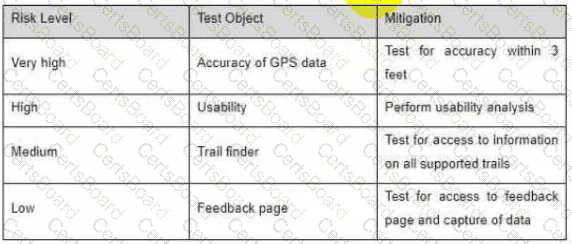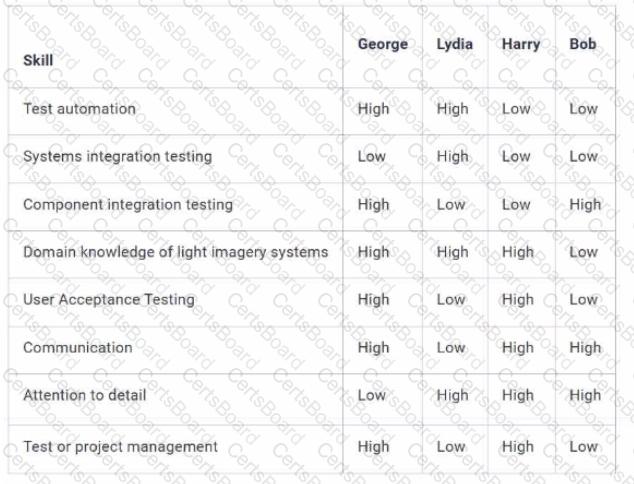In what environment are you most likely to see multiple defect management systems used in one project?
Which of the following Is the common set of information to be produced in a test estimate''
Your team has been assigned to a new project You have a mix of manual testers and automation engineers but everyone is currently doing manual testing. The development learn has alreadydecided to use DevOps as its approach but they have never used it before and are happy to take your input Unfortunately, about 50% of the development is completed already In the testing your team is doing they are finding that about 40% of the defects they catch are actually regressions caused by other changes
Given this information what should you do to help mitigate risk'?
Which two items are MOST important for inclusion in your tool selection plan for batch-only performance testing?
You have decided to help your team improve their skills. One of their assignments is to mentor a junior member of the team Which competency should you expect the mentor to develop during this exercise?
You are managing the testing for a bank card project. The testing was scheduled to take 10 weeks but by the time the software was developed only six weeks were available for testing Knowing there were a lot of risks with the software your team started testing activities early by overseeing code reviews, defining acceptance criteria by working with the users and by doing all lest creation prior to the code arriving
You are now three days away from the go-live date Your testing has mitigated all the high and medium risk items leaving only the low-risk elements unmitigated by testing You estimate it will take two weeks to manually test the low-risk elements At this point what should you do?
Your team has been working on an Agile project for two months. There is a retrospective at the endof each sprint One of the data items reviewed is how many defects are being caught by users rather than by testers. The test team is being blamed for these escapes
What do you need to do to make these sessions more productive?
You are managing the test team that is testing a new mobile application that provides a "step-by-step' hiking guide Your risk assessment resulted in the following table:

Your team has clone the depth and breadth testing for the GPS accuracy and usability features but when the product was given to beta testers there were some issues Despite the users reporting the app was easy to use at least one user walked off the edge of a cliff and another one ended up in a river. Your team has confirmed that the functionality is working correctly. and the GPS information is accurate.
What other area of testing should you now prioritize?
You tend to be conservative in your project estimations because you know how many things can go wrong and extend the schedule. You manager is not happy with your estimates and thinks you are being too negative with your numbers and not trying hard enough Which estimation method should you use to provide your manager with a positive' number while still also providing the number you think is more realistic?
Refer to SCENARIO 2 - You have been tasked with recruiting testers for Project 3 to help design and run regression tests, you have been provided with a skills matrix for four prospective candidates. The matrix shows the skill level (High or Low) for each candidate:

Which candidate would be the MOST suitable for a test analyst role on Project 3?
SELECT ONE OPTION


